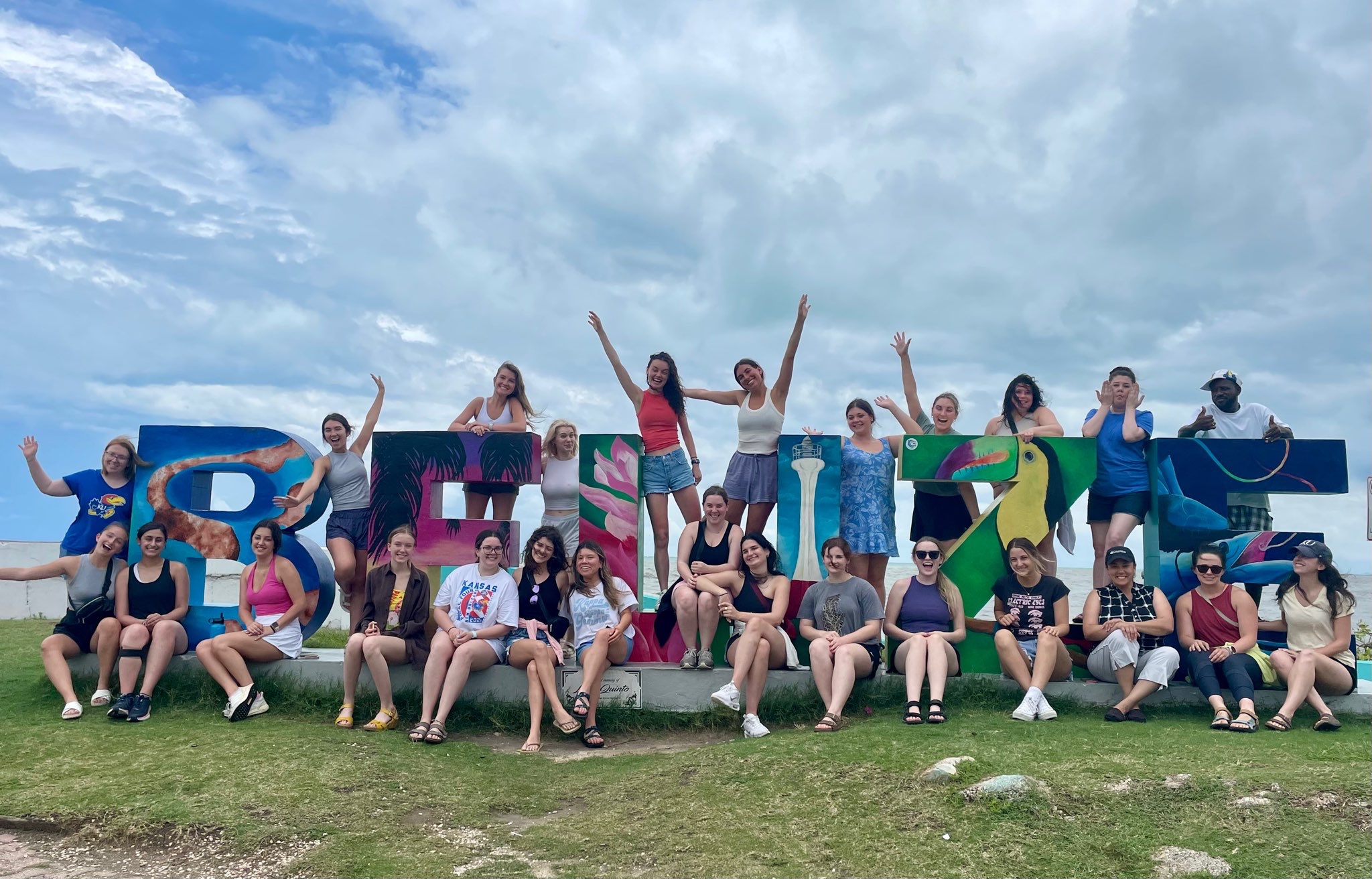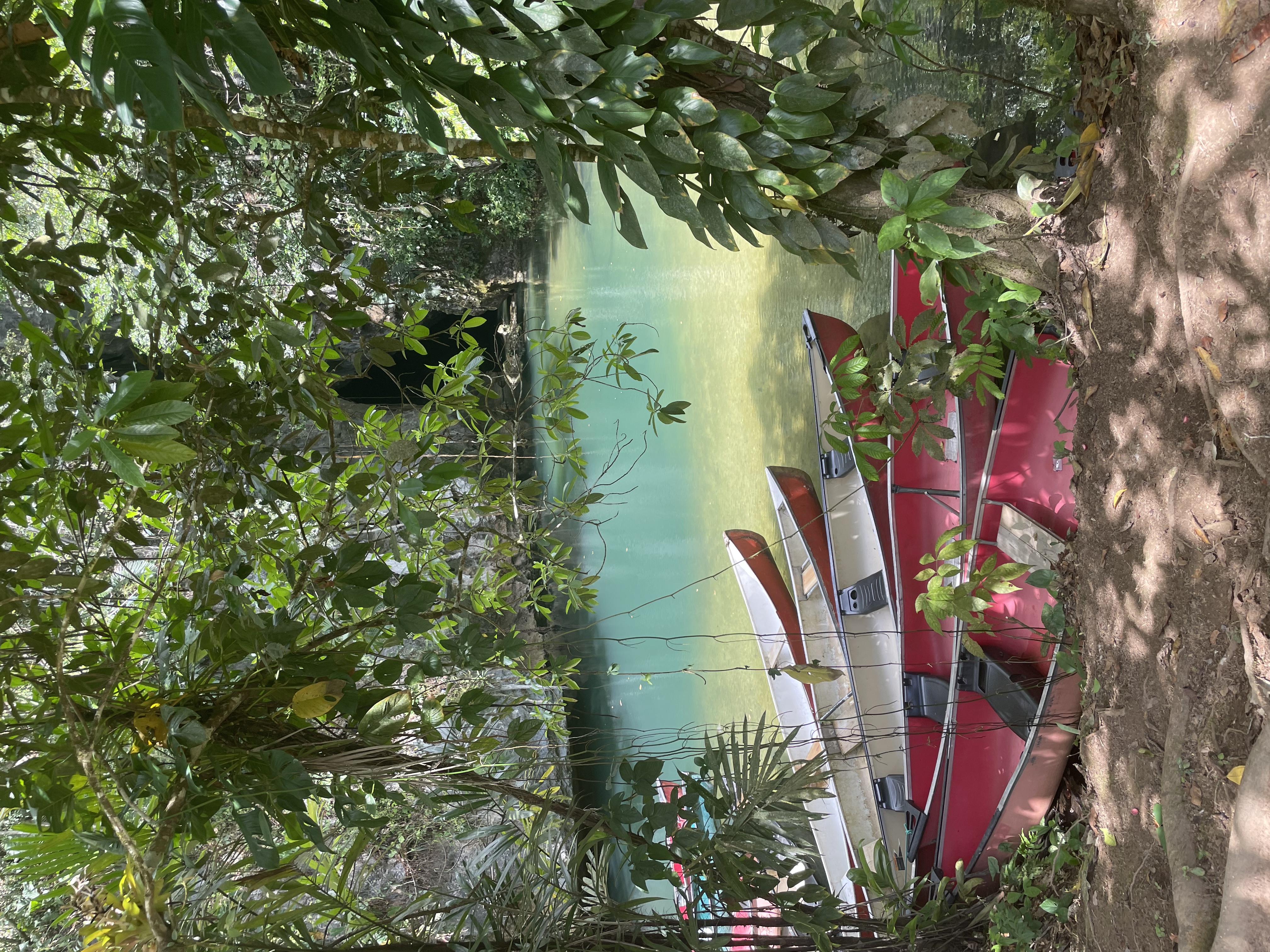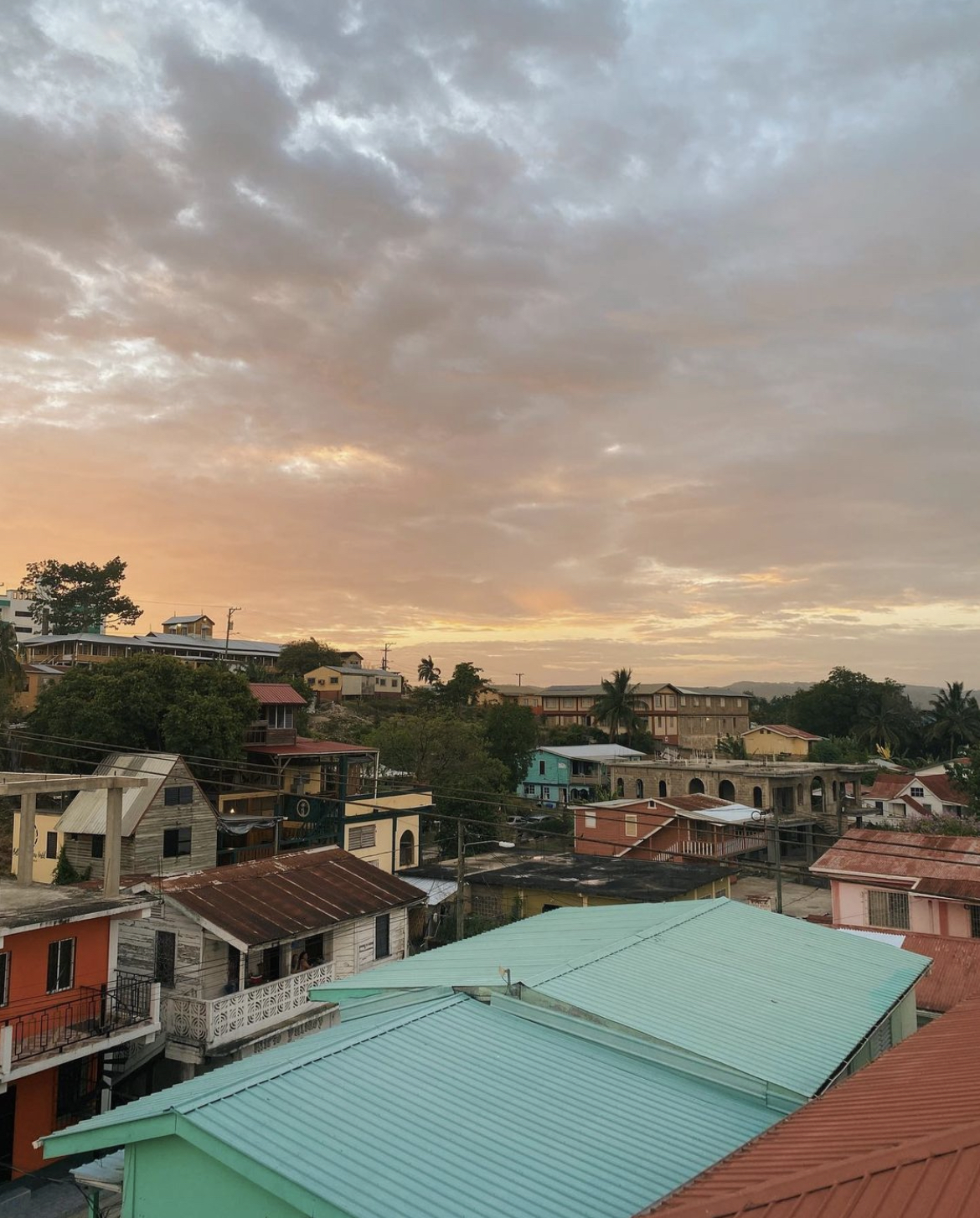Studying Abroad with a Disability
My name is Maiya Schroeder and I am majoring in Applied Behavior Science and Sociology. To study abroad, I enrolled in a speech, language, hearing class. The program was called “Services for Children with Special Needs in Belize” and it was a twelve-day program during the summer of 2022.

You cannot over-prepare! I started researching and preparing 10 months before I wanted to study abroad, and I felt that I could have started even earlier. Utilize as many resources as you can. I relied heavily on KU Study Abroad & Global Engagement (SAGE) and the Student Access Center (SAC), and they were amazing resources throughout the entire process! My objective is to create a space where students with disabilities can share their study abroad experience in hopes of providing helpful information to students and organizations. Students with disabilities should have an outlet where they can acquire firsthand knowledge and experiences. KU Study Abroad & Global Engagement and Student Access Center can also use this information to improve their services and have more knowledge on how to help students with disabilities prepare. The end goal is to make studying abroad accessible to a wider range of students, so if you can offer your experience please do!
My disability:
I have right-side hemiplegia which means the entire right side of my body is partially paralyzed. I use a leg brace daily, and a trekking pole in certain situations, and frequently use belt bags and backpacks for assistance carrying items. For my study abroad program I brought a waist/belt bag that I wore around my shoulder and chest for easy access to necessities like my phone, money, passport, and other documents. Additionally, I bought a carabiner so I could attach my water bottle to my belt bag and avoid having my left hand full. I wore my leg brace everywhere and used my trekking pole when I was on uneven ground or in shallow water. I needed a lot of help, so I also relied heavily on the staff, faculty, and other undergraduate students I was working with.
Before going abroad:
- Contact KU’s Student Access Center to start talking about accommodations abroad
- I contacted the Student Access Center before I knew which program I was applying to. I asked for general advice and common questions they have answered for studying abroad. This gave me an idea on what to start researching and acquiring before going abroad.
- Your SAC advisor may need extra information and/or documentation to help you obtain accommodations.
- If you are working with a university abroad, they may not be able to provide you with the same accommodations you have at KU. The SAC can work with SAGE and organizations abroad to make your experience as accessible as possible.
- Some accommodations may cost money. I wish I had researched ways to have these costs covered partially or fully. For example, I had to pay for taxis when the walk was too long for me to make. Small expenses like this can add up over time, so I recommend researching and asking about options for financial coverage.
- Contact KU Study Abroad & Global Engagement for help finding an accessible program
- I worked with a program coordinator and talked through programs I was interested in. We went over how accessible programs may be, research I should do about the locations, and activities included with the programs. The program coordinators are mostly divided by world regions, so depending on the programs you are interested in, you may have to work with multiple program coordinators. You can ask how to contact/find assistance with contacting the institution or organization abroad for more information on accessibility before you decide on a program.
- Potential questions to ask and research:
- Do the airports abroad require you to enter and exit planes through stairs? What are the ground types? (ex: gravel, sand, brick, concrete, grass)
- Is the ground generally flat?
- Are there sidewalks and are they big enough to fit mobility aids?
- What housing will you be living in?
- Are there accessible entrances, rooms, and bathrooms?
- Be thorough with this information.
- What transportation will the programs use? Is there available alternative transportation if needed?
- Is transportation and housing accessible to service animals?
- Will you always be traveling in groups?
- What is the primary language in the host country(ies)?
- Will you have accessible directions and/or a map?
- Is there insurance or is insurance needed for any kind of aid or devices?
- What is the exchange rate between U.S. dollars and the currency of the host country?
- Do you have access to something to help calculate money conversions?
- Does the host country’s money use the same number symbols as the U.S.?
- If not, can you look up what each symbol represents?
- Will your university abroad offer accommodations for classes and homework/projects?
- If so, which accommodations?
- Contact the faculty director. Each program has a faculty director. They may have experienced the program before and have valuable information. The faculty director should be aware of any accommodations you may need.
- Ask for pictures from organizations abroad and the study abroad office of housing, transportation vehicles, campus grounds, and local areas/cities that you may be traveling through. If they cannot send their own pictures, ask for exact locations so you can look up pictures. This will help you understand how accessible an area may be. I did not do this, so I ended up relying on how accessible others thought it might be for me. This was uncomfortable and caused problems once I arrived.
- Mobility International is a website with information on disabilities and accessibility abroad. It is worth looking though for advice and information on other individuals’ experiences. They have resources to find accessible leadership programs and other experiences if KU doesn’t have a program that suits your needs. They also have funding and scholarship resources. https://www.miusa.org/
- KU Study Abroad & Global Engagement provides insurance to all students called AIG. They have global services that assist you in emergencies including medical, security, and lost documents. They also provide information on which medications are legal to bring into or purchase in the host country and lists of English-speaking doctors, clinics, and hospitals.
- If necessary, contact your doctors or other health professionals once you know where you are studying abroad. They can give you information and advice for traveling, including traveling with medical devices, mobility aids, medications, food restrictions, vaccines, obtaining extra devices, and insurance that may be beneficial to you. This will help make sure you have thorough advice and information for your needs.
- Make appointments to communicate in person or over Zoom. This will leave less room for interpretation and help make sure everyone is on the same page. If possible, have a meeting with SAGE and SAC together to talk over everything. The entire process may take multiple meetings, so I found it beneficial to start early. I started ten months before I wanted to study abroad.
- Try and get to know other students on your study abroad trip. I found I had to constantly advocate for myself, but knowing someone on your trip who understands your needs can make it easier and less frustrating.
- Purchasing an International data plan would have been extremely helpful. They are available for most service providers. This will make sure you always have a way to contact someone. Look into plans, and ask if organization leaders, professors, and/or other students will have data plans so you know who you can contact at any time.
- Use an airline that will be most accessible to you. Most programs have group flights, however; if those airlines are not accessible to you, you are not required to book the group flights. I booked flights on a separate airline that arrived abroad before and departed abroad after the group flight. This ensured that I was at the airport when the group transportation arrived and in time for my flight home.
- If necessary, most airlines will let you request a wheelchair and/or pre-board. This can help you get through the airport, have extra time boarding the airplane, and get help stowing carry-on luggage. If this is not something available to request when purchasing a ticket, the customer service/help desks at the airport can usually add it to your ticket.
- Additionally, requesting a wheelchair to go through customs (going into and out of the country as well as back into the U.S.) can be beneficial. This was helpful to me as it let me skip the line. I avoided standing for a long period of time with a heavy backpack, and I had help with my legal documents going through customs.
- When exiting planes at small airports, you are often expected to walk down stairs from the plane to the ground. If this is not something accessible to you, talk to the study abroad office. They may be able to help you research if the airport primarily uses stairs to exit the plane, what the airport’s process is if you cannot use stairs, and how to make sure the airline knows you need an alternative path once you get there.
- All medications should be in your carry-on bag.
- Make sure to have copies of insurance (travel and health), personal documents (passport, ID/ Driver’s license, school ID, visa, etc.), and the program itinerary and addresses. This will ensure you are prepared even if you lose something or find yourself in an emergency.
- When going to another country, there is usually a customs form that requires you to know where you will be staying, why you are visiting, what you are bringing, and if you want to declare any items. If you have mobility aids, medications, or other belongings that you need to bring, ask for advice from SAGE or your health professionals. I did not declare any items, but you should research and ask questions specific to your needs and belongings. This document uses uncommon words that were difficult to understand, and it was given on the plane with limited time to fill out. If possible, search for it online so you know what to expect or ask SAGE about the form and how to fill it out.
During your time abroad:
- Be prepared to advocate for yourself constantly. I was frustrated at times because I felt that I was repeating myself a lot. The more you prepare ahead of time with the people you are going to work with, hopefully the less you will need to repeat yourself.
- Know that other countries may not be as accessible as the U.S., and therefore they may be unfamiliar with providing services you may need. You will have to be comfortable advocating to people you just met. You may also need to rely on others to help you advocate. For example, the professors I worked with helped advocate for me to the provider organization.
- Don’t be afraid to say “No, I do not need help”. There were multiple situations where I received “help” that I did not need. This made it harder for me to accomplish what I was doing, however I felt uncomfortable declining “help” too often. If you are uncomfortable, having a buddy or support from leaders/professors to reiterate that you don’t need help is an option, especially if there is a language barrier between you and the people with whom you are interacting.
- Meet with your professors, leaders, organizations, and others you will be interacting with when you arrive abroad. Take time to re-explain your disability and what you can and cannot do. This may help clear up any misunderstandings, reiterate your needs, and make sure everything is set up and ready for you (in hopes of easing the advocacy needed on your part). I found that there was a misunderstanding of my disability when I arrived abroad, and people were assuming things for me. This made the experience more difficult and explaining it one more time would have been beneficial. Be thorough on what YOU think even if the organization abroad thinks otherwise.
- Because my disability is visible, I received attention from local people, was asked questions regarding my disability, and was given support through the form of prayer. Be prepared for people to be curious as they may be unfamiliar with your devices and aids. Additionally, support in other countries comes in many forms. You should NEVER feel uncomfortable or forced to converse (make sure you stay with the group and can move away if needed); however, be respectful of the culture as they are also welcoming you into their country.
- Keep a log of everything that goes right, everything that could be done differently, and everything that went wrong. Both SAGE and SAC are always looking for ways to improve. The more information you can provide, the better the process will be for the next student. After studying abroad:
- If you feel comfortable, talk to SAGE and SAC to share your experience. There are multiple ways to share and help other students with disabilities who want to study abroad.
- Share advice to the organizations you worked with abroad. They are also looking for ways to improve so any information helps. My program coordinator relayed this information to the organization abroad on my behalf.
Benjamin A. Gilman International Scholarship Program:
- The Gilman program is an international scholarship opportunity that offers extra support in the form of advising, financial support, and insurance that covers accidents, emergency evacuations, health, and repatriation of remains. It also teaches you skills for academic and career development, exposes you to diverse languages and cultures, develops networks to advance national security and economic prosperity, and helps students develop relationships with others in and outside of the Gilman program.
- To be eligible you must be receiving the Federal Pell Grant during the time you will be traveling abroad, and you must be a U.S. Citizen or National.
- As a person with disabilities, I had to spend more time and money preparing to study abroad than my peers. The financial support helped pay for what was a once-in-a-lifetime experience.
- The Benjamin A. Gilman International Scholarship Program requires a follow-on service project after your study abroad program is over. I decided to use this opportunity to provide information for other students with disabilities who want to study abroad. I did not have access to information from students with disabilities at KU who also studied abroad, and this made the process more difficult. I want to start building a compilation of information dedicated to students with disabilities who want study abroad. The more information we can provide to future students, the more accessible study abroad programs will become, and the more staff and faculty can be prepared to help.
- I suggest looking into the Gilman program and if applicable, applying. It is an amazing scholarship and service opportunity.
- The Gilman Program is an amazing program that “has been successful in supporting students who have been historically underrepresented in education abroad” (Gilman, n.d.) including students with disabilities. Check out this resource if you plan to study abroad!

